
Sleep from a scientific perspective
"After 40 years of sleep research, I have found no factor that has a greater influence on our well-being and health than sleep. Over 90 % of our health depends on sleep."
Prof. William C. Dement, MD, 1998, Sleep Research Centre, Stanford University
After decades of research, science now agrees that well-being, performance, physical and mental health, a strong immune system and much more depend on sleep. The quality and duration of sleep play a decisive role in this. Despite everything that is known about the importance of sleep, it is still often underestimated and neglected.
QUICKLINKS
Better performance through good sleep
The National Library of Medicine (NIH) lists more than 10,797 entries for the search query "sleep is important for health".
Restful sleep is considered the most important source of regeneration for body and mind. At the same time, the consequences of too little sleep are now well studied. Lack of sleep not only makes us tired, unfocussed, stressed and ill, but also old. All phenomena that are undesirable in an active and productive lifestyle.
Sleep is measurable
Sleep used to be understood as a continuous recovery phase in which body and mind are apparently inactive. It was not until the middle of the 19th century that sleep and its depth began to be researched and the very complex interrelationships gradually understood. Although our body rests during sleep, our bodily functions are not simply switched off. Some organs work less, others more. To regulate all this, the brain runs at full speed during sleep! We go through different sleep phases with different functions.
Test setup
The test subject is injected with a contrast agent. The red-orange areas indicate activity. As soon as the subject closes his eyes, he begins to fall asleep, the brain cells calm down from the day's activities and begin to fire in a regular, rhythmic pattern. The moment the subject begins to dream, the brain cells fire actively and in a random rhythm. The brain activity in REM dream sleep is then similar to that in the waking state. Only in deep sleep is brain activity really very low and the brain can detoxify and regenerate.
Our sleep phases
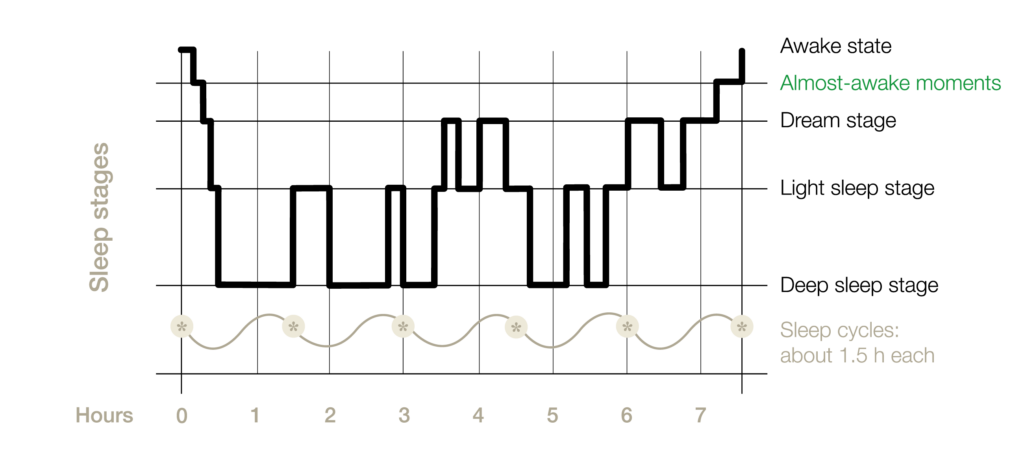
The continuous measurement of brainwave frequencies (EEG) is graphically converted into a sleep profile. From falling asleep to light sleep, deep sleep and REM dream sleep, the individual sleep phases and their percentage distribution throughout the night can be recognised. Healthy sleep is characterised by 5 sleep cycles of approx. 90 minutes each - this results in an ideal average sleep duration of 7.5 hours.
Falling asleep phase
It is easy to be woken up during the phase of falling asleep and during light sleep, also known as non-REM sleep. These sleep phases form the transition to the deeper sleep phases and are of crucial importance. Breathing slows down and the heart rate and body temperature begin to fall. Ideally, the sleep phase lasts 10 to 15 minutes. Anyone who falls asleep immediately usually suffers from a temporary or general sleep deficit.
Light sleep
In light sleep, the heartbeat and breathing slow down - the body prepares itself for the deeper sleep phases. The brain's electrical activity increases and we can dream, albeit not as coherently and vividly as in the REM phase. In this phase, it is still very easy to be woken up, combined with the feeling of not having slept yet. Contrary to what the name suggests, light sleep is essential for a restful night. After all, we spend 45 to 50 per cent of our total sleep time in light sleep.
Deep sleep
The deep sleep phase is the most physically restorative phase of sleep, in which the muscles relax completely. Body temperature and blood pressure drop and the metabolism works slowly. Bones, muscles and damaged tissue are repaired and rebuilt. Deep sleep is also very important for the brain. US researchers have discovered that our brain also has a detoxification system that is similar to our lymphatic system. It is called the "glymphatic system", derived from the glial cells. Put simply, the spaces between the brain cells are cleansed of deposits such as beta-amyloid by the cerebrospinal fluid (CSF). Deep sleep is therefore very important in preventing neurological diseases such as Alzheimer's or dementia. The deep sleep phases mainly take place in the first third of the night and healthy sleepers spend around 15 to 25 per cent of their time in deep sleep phases.
REM sleep / dream sleep
The REM sleep phase, also known as the dream sleep phase, is the abbreviation for "Rapid Eye Movement". During this phase, we dream and our eye movements are clearly visible when our eyelids are closed. During this phase, we process the events of the day, organise information and transfer what we have learned into our long-term memory. If we are woken during the REM phase, we often remember our dreams. These phases are particularly important for reducing emotional stress and therefore for our mental and emotional health. The REM dream phases are particularly pronounced in the second and third third of the night, with the dream phases becoming significantly longer towards the morning. We dream for around 20-25% of our sleep time, which is an average of 5-6 dream episodes.
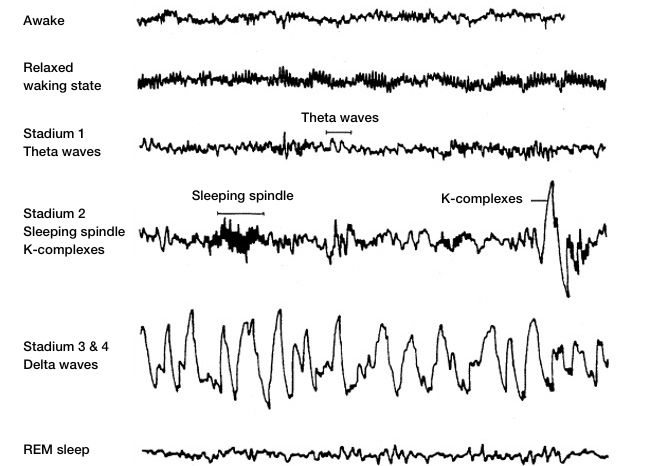
Brain waves in the sleep phases
Brain waves are the sum of all electrical activity in the brain or cerebral cortex. As the brain processes information, its electrical state changes. This results in potential fluctuations of between 5 and 100 microvolts, which can be measured directly on the head using an EEG (electroencephalography). Depending on the state, different frequencies can be measured, which are categorised into the following spectra depending on the oscillation:
-
Gamma waves (> 25 Hz.): These are the fastest measurable brain waves. We need them for learning, memory and processing new information.
-
Beta waves (> 13 Hz.): These brain waves are most recognisable when we are awake, solving problems or concentrating.
-
Alpha waves (8-13 Hz): This wave often occurs when we are awake and resting comfortably, daydreaming, reacting to visual stimuli or thinking about something in a relaxed and creative way.
-
Theta waves (4-8 Hz): They occur when a person is in the light sleep phase, dreaming or in a relaxed, meditative state of mind (commonly referred to as "autopilot").
-
Delta waves (< 4 Hz): These brain waves occur during the deep sleep stages.
This measurement of brain waves makes it possible to divide sleep very precisely into different phases and create a sleep profile from this. The duration of the individual phases can vary greatly from night to night, but on the whole we go through several cycles from wakefulness to REM, light sleep and deep sleep and back again. We spend most of our time in light sleep. How much time we spend in deep and REM sleep varies from person to person, but can be significantly optimised by taking appropriate measures. Waking time can also be reduced, thereby improving the quality of sleep. But how long should we sleep?
How much sleep do people need?
How much sleep a person needs depends on various factors and is very individual. Numerous studies suggest that the optimum amount of sleep is between 6.5 and 8 hours. Less sleep leads to sleep deprivation in the long term. The consequences are poor concentration, weakening of the immune system, increased risk of injury during sport, reduced sensory performance, listlessness and much more. A sleep duration of significantly more than 8 hours indicates an increased need for recovery and therefore a sub-optimal physical or mental condition. However, there is no generally applicable rule.
Life circumstances and the need for sleep
Life circumstances have a strong influence on the need for sleep. Among other things, the need for sleep can increase during heavy sporting activity, illness or stress. Contrary to popular belief, however, sleep cannot be "made up" by sleeping more. You are only really fit and productive when you have slept well for several nights in a row.
Tip: Determine your own sleep needs
The best time to find out how much sleep you need is on holiday or on holiday, when you don't need an alarm clock. If you always go to bed at the same time every night and only get up when you feel rested and fit. But that doesn't mean you have to stick to this time. With a few adjustments to your sleeping place and lifestyle, you can reduce the amount of sleep you need. Quality instead of quantity is the motto.
This is what a sleep profile looks like
It's not just the length of time you spend in bed that determines how rested you feel at the end of the night. The quality of sleep is the most important factor. Sleeping and healthy sleep are two different things, because healthy sleep requires a sufficient number of complete sleep cycles with as few interruptions as possible. There must be enough deep sleep and REM sleep, and the body must be able to achieve these phases. If this is not possible, our body and brain cannot fully regenerate.
By improving the quality of sleep, we could therefore spend less time in bed and still wake up fully rested. Conversely, a sub-optimal sleeping environment can mean that we are not fit and rested in the morning despite having slept for more than eight hours. A loss of sleep is not made up for by sleeping more, but by getting better quality sleep. There are shifts within the sleep cycles. If you sleep poorly one night, deep sleep often increases the following night - if the conditions for healthy, restful sleep are met. Find out what these are now.
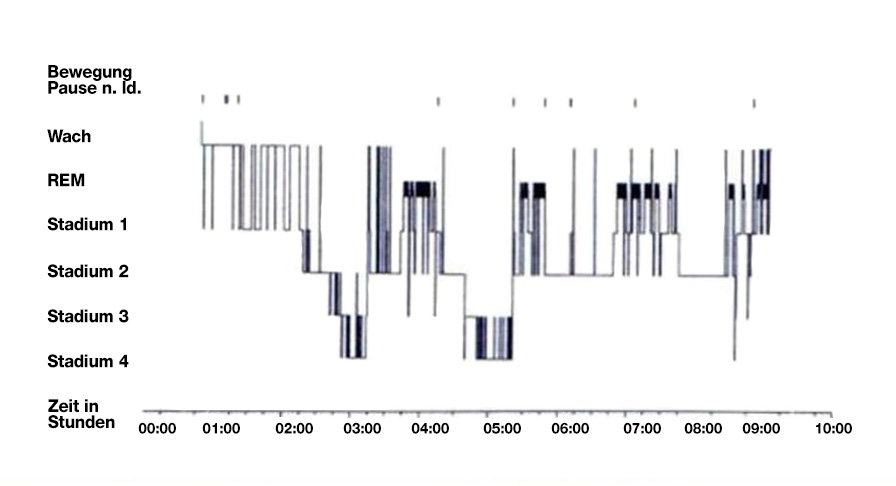
Sleep profile: Sleep disorders
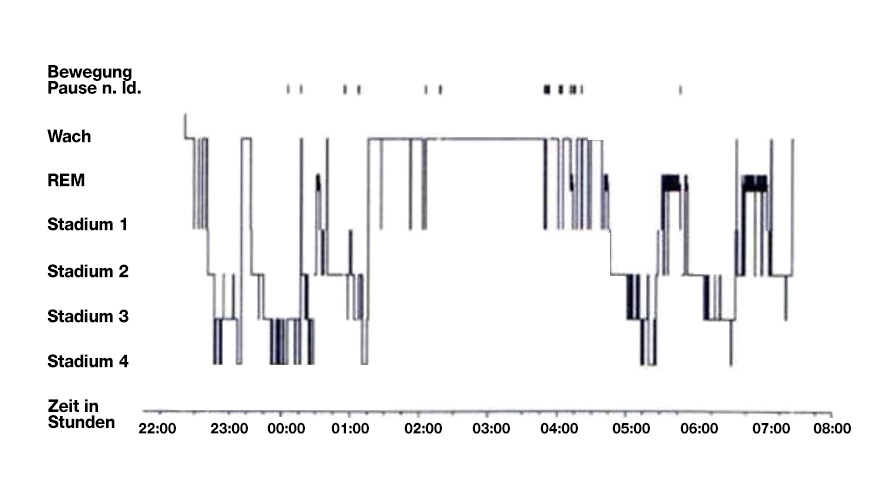
Sleep Profile: Difficulty sleeping through the night
Which factors are most important for sleep?
1: The sleeping environment
2: Healthy diet
3: Bioactive water
4: Sufficient daylight and sunlight
5: Breathing and meditation
6: Physical and mental fitness through sport
7: Positive self-development
8: Avoid toxins and harmful radiation
9: Breaks and rest
How do you achieve optimum sleep quality?
In order to achieve optimum sleep quality, certain key factors must be fulfilled. These work synergistically, i.e. they support each other in their effect. If key factor no. 1, an optimised sleeping area and a healthy sleeping surface, is not fulfilled, the other factors cannot be fully effective either.
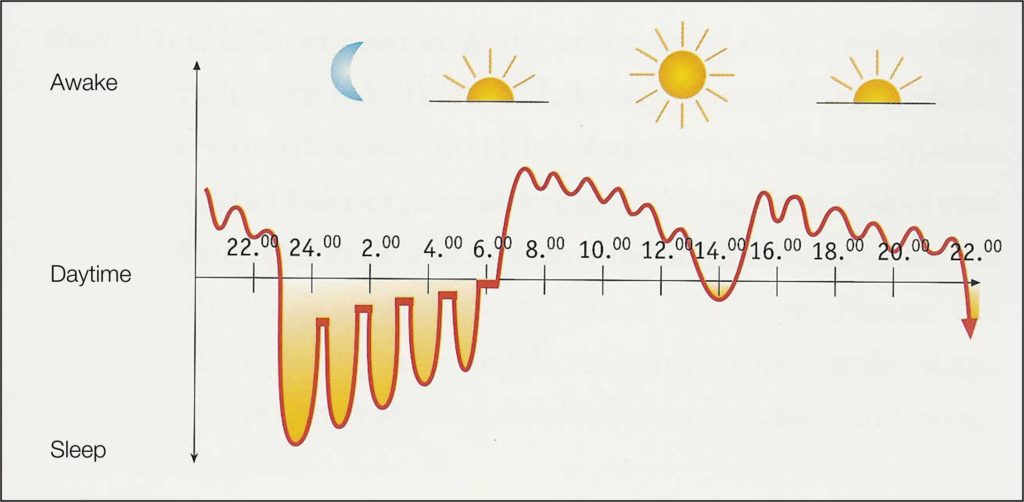
Can our sleep health even be defined?
Increasing health problems require a reassessment in which health is defined not only as the absence of illness, but also as well-being and performance. Scientific studies show a clear link between disturbed sleep and health problems. The measurability of sleep, even outside the sleep laboratory, enables a more precise assessment of sleep health. This is not only important for individual health, but also provides information on the health of society. Healthy people sleep sufficiently and restfully, while people with health problems sleep poorly and too little. The definition of sleep health is crucial for the future of sleep medicine and supports medical-therapeutic approaches to improve the health of the population.
How do you assess your own sleep quality?
With the help of modern technology, new scientific findings and our subjective perception, we can assess our own sleep health. We at SAMINA have been working on this topic since 1989 and are happy to help you scrutinise and improve your sleep quality. Take advantage of the 100% free and non-binding sleep analysis now and together we will find out what healthy sleep can look like for YOU.






